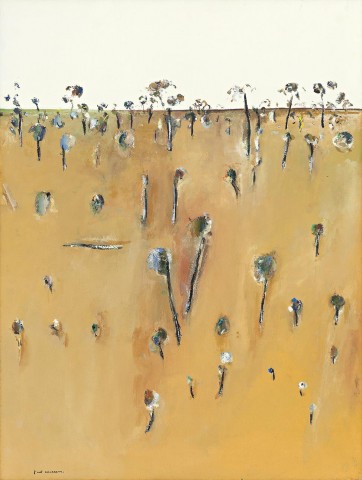UNTITLED LANDSCAPE I, c.1966
FRED WILLIAMS
gouache on paper
75.5 x 57.5 cm
signed lower left: Fred Williams
Rudy Komon Gallery, Sydney (label attached verso)
Mr James Cromie, Sydney
Thence by descent
Private collection, Melbourne
Art Equity, Sydney (label attached verso)
Private collection, Malaysia
Accompanied by a certificate of authenticity, Rex Irwin Art Dealer, Sydney, signed and dated 29 July 2010.
Fred Williams reached his maturity as a painter in the mid-1960s, elevating his idiosyncratic style of landscape painting to unprecedented levels of critical acclaim and positive public reception. Consolidating and refining his stylistic devices to a rapid shorthand, Williams began working more frequently en plein air with quick drying gouache capable of recording immediate observations of the landscape. Williams worked restlessly in series, exploring in each of them a new set of formal precepts rather than a subject or motif. Works such as Untitled Landscape I, c.1966 show the points of junction between series, where defining elements of previous investigations were carried over to the next, providing stylistic bridges to unify his oeuvre.
Untitled Landscape I is a quintessential example of Williams’ painterly simplification of the vast Australian landscape to its most defining elements: colour, space and a random smattering of marks illustrating essential topographical features. Created shortly after his return from the Helena Rubinstein Travelling Art Scholarship, back at home at the foot of the Dandenong Ranges, this work displays the defining feature of the Upwey landscapes, a shallow vertical depth with a razor-edge horizon line bisecting the painting both compositionally and spatially. Williams presents a bold dichotomy between delicately nuanced washes of yellow ochre gouache and a narrow strip of stark white sky.
Williams’ radical abridgement and abstraction of the Australian country provided a modern alternative to the lyrical narrative landscapes of the Heidelberg school and the nationalistic mythology of the Angry Penguins group, exploring instead how the basic building blocks of colour and form alone could communicate what the artist felt was the pictorial truth of the land, recorded lucidly and without hierarchy. Untitled Landscape, like many of Williams’ works of this period, both in gouache and oil, evokes the overwhelming scale of the Australian landscape. By tampering with linear perspective and reducing the points of reference, Williams creates a wall-like section of landscape populated with trees and scrub whose scale and spatial relationships remain ambiguous.
Williams suggests the monumentality and vastness of the Australian landscape in rural Victoria with a remarkably relaxed facture. Anchored by the bold vertical marks of tree trunks in the centre of the composition, the image is counterbalanced by a painterly canopy of gum trees exploding in liberated gesture beyond the horizon line. These flourishes demonstrate Williams was being drawn further away from the panoramic ambiguity of the You Yang works and the literal formalism of the earlier Sherbrooke Forest series, prefiguring the delicate and light-filled touch that would characterise the Lysterfield works yet to come.
LUCIE REEVES-SMITH
